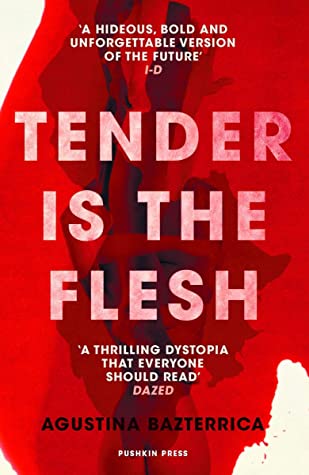
When animals infected by a fatal virus (GGB), animals consumption is considered dangerous. The governments initiated the "Transition", naturalised cannibalism where humans bred as animals for consumption. Groups of people had started killing others and eating them in secret. Governments legalised the adaptation of the processing plants and regulations to breed people as animals to supply the massive demand for meat. Although the population and poverty were reduced, the "Transition" receives massive protests by human rights organisations. At the same time, researchers claimed that animal protein is essential to life which cannot be replaced by plants. Experts assured that gas emissions had been reduced, but at the same time, malnutrition is on the rise. Human meat is labelled as "special meat" and treats as a product.
Marcos Tejo has been struggling with his conscience and haunted by the killings. From time to time, he keeps questioning why he has to work in the meat business. Besides trying to grapple with the reality of cannibalism, the story continues revealing more details about Marcos's personal life. His wife has moved back to her family after their baby has died. His father's health is deteriorating, and his selfish sister never cares about anyone other than her own family.
One day, he receives a gift - a woman with FGP (First Generation Pure) quality but has the most human look as a domesticated animal. FGP is a premium grade quality meat which means the human has no genetic modification. The "meat" doesn't talk because her vocal cord has been removed. Although Marcos is a respectable man in the meat business, he is incapable of slaughtering the gift. In this new world, slavery is illegal and brutal but not cannibalism. It's unlawful to have relationships with a domesticated human because it's inappropriate to enjoy them. Anyone who commits such a crime will be sent to Municipal Slaughterhouse. Aside from the meat business, it also reveals the impact of the virus in other things related to animals. Marcos remembers the memories he shares with his father before the zoo is empty and becomes an abandoned place. As the story goes further, Marcos expresses his difficulty to accept human meat as food and trying to suppress his disgusts about others. His work and the cannibalism surrounding him has gradually turned him into a ruthless person.
It feels like reading a story of running a meat business but swapping animals with human meat. Am I a cannibal or a cold-blooded person if I loved the story? But I won't turn into a cannibal because I can't imagine how tasty is human meat, as mentioned in the book. To be honest, the story provides gruesome details of meat processing is almost the same as what humans do to animals. I wonder how many people will switch to become a vegan after reading this book. The realism is undeniable with the detailed procedures in processing human meat and flaying machine to rip the skin into perfection. The tannery owner shows a sample of skin from a folder. It reminds me of choosing a sofa when the salesperson offers you a thick folder with sample fabrics and leathers.
The story expresses the loneliness of Marcos being in the absurd world without anyone that he can talk to. Somehow, the narrative style strikes a resemblance to Japanese literature - abstract, dark, and weird. I have to admit that I was shocked, distressed and speechless with the ending. The ending reveals the innermost of Marcos, something that has been overshadowed by other characters throughout the story. Probably the fruit that he bears brings the most actual side of him that he never knows until that event. It's like you never know how you feel or react until you face death or you feel disgusted with a traitor's act. But when your life is in danger, you probably become a traitor and how others perceive you is no longer your concern at that critical time.
ISBN: 9781782275589 (ebook)
Number of Pages: 192
Rating: ★★★★★ (5/5)
More reviews can be found on Goodreads: The Tender is Flesh by Agustina Bazterrica.